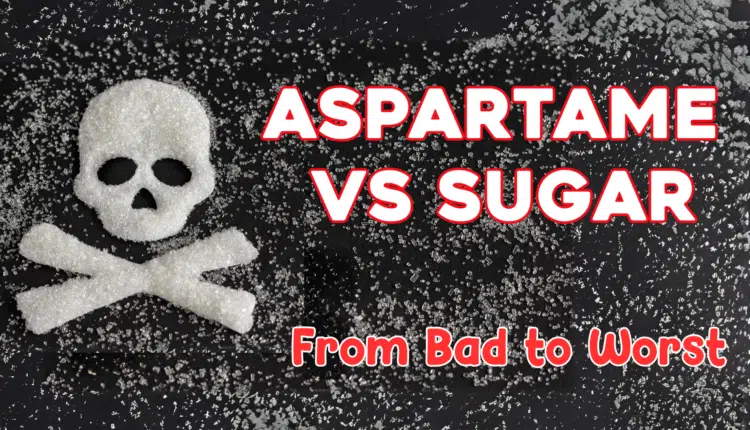Is Aspartame Worse Than Sugar?
Aspartame, this artificial sweetener may be worse than sugar despite claims that it’s a healthier option.
Cutting back on sugar when attempting to get healthier or recover from illnesses is good first step. However, when we expose ourselves to diet drinks and aspartame-laced products we may be doing more harm than good.
What is Aspartame?
Aspartame is sweeter than sugar, virtually calorie-free, and has no aftertaste. Over the years, it became one of the most popular artificial sweeteners today.
Large varieties of foods and beverages contain aspartame, such as diet drinks such as:
- Sodas
- Snapple
- Crystal Light
- Ice teas
Some breakfast cereals, such as Fiber Active Bran cereal, contain aspartame. Other foods with aspartame include yogurt, sugar-free chewing gums, Jello, sugar-free gelatins, and the Metamucil sugar-free four-in-one fiber drink.
The FDA approved aspartame in foods and beverages in the early 1980s. Since then, continual evidence has surfaced within the science community and general public regarding the dangerous effects on the body.
Consumers reported over 7,000 adverse reactions to aspartame to the US Food and Drug Administration. Even after seeing the reports, the FDA still claims the sweetener is safe.
Aspartame Damages Peripheral Nerves
Aspartame has worse effects on the nerves than sugar. When you consume aspartame, your body breaks it down into three components:
- Aspartic acid
- Phenylalanine
- Methanol
When metabolized, these three ingredients cause a significant disruption to the healthy function of your cells. Aspartame metabolites increase the excitoxity of nerve cells in the brain and peripheral nerves. Excitoxity means they cause excessive overstimulation, resulting in damage or death of neurons.
Excitoxity affects the peripheral nerves, which continue to fire repetitively in an abnormal fashion. One of aspartame’s metabolites, aspartic acid, damages cellular structures within the peripheral nerves and their DNA, which can result in nerve cell death.
Aspartame Wreaks Havoc on The Central Nervous System
Aspartame can cross the blood-brain barrier and reduces essential neurotransmitters like dopamine and serotonin. These two neurotransmitters work together to provide chemical balance in the brain, helping with mental health, digestion, and sleep.
Imbalances in dopamine and serotonin from aspartame can lead to mood disorders like depression, irritability, anxiety, and decreased cognition (learning and memory).
Research shows that long-term exposure to aspartame may increase the risk of neurodegenerative diseases like Alzheimer’s and Parkinson’s disease.
One study found that long-term aspartame consumption harms the structure of the sciatic nerve, the largest nerve in your body. Several other studies linked aspartame to neurological symptoms like headaches, dizziness, mood changes, and cognitive impairment.
Should I Stop Drinking Diet Sodas?
Anyone interested in living a healthy, vibrant life should avoid diet sodas and any other products with aspartame, especially if you suffer from neuropathy. Studies have found that long-term aspartame use causes damage to the myelin sheath, the protective coating around nerve fibers. This damage can distort and interfere with nerve signals.
It also causes damage to the nerve fiber, which is called the axon.
Another metabolite of aspartame, methanol, converts in the body to formaldehyde, which is known to cause DNA damage and nerve cell dysfunction in peripheral nerves.
Some people claim aspartame is safe because it doesn’t accumulate in the body. Despite being immediately broken down, the metabolite, aspartic acid, accumulates in the body. Specifically, aspartic acid stays in the brain, causing damage to the myelin sheath of the brain’s nerve fibers.
Is Aspartame Worse than Sugar?
Although sugar is bad for our health, aspartame is even worse than sugar. Researchers also found that aspartame’s damage surpasses that of the nervous system.
Artificial sweeteners cause gut dysbiosis, an imbalance of bad bacteria in your microbiome. Ironically, this imbalance may lead to weight gain, digestive issues, and immune problems.
Scientists found that aspartame causes Leaky Gut Syndrome. This is a condition were the intestines become to permeable and lose the selective selection of what crosses the gut barrier. This leads to unwanted substrates leaking into the bloodstream, causing systemic inflammation and many health issues.
The World Health Organization classifies aspartame as a possible human carcinogen, which may increase the risk of lymphoma, leukemia, urinary tract tumors, and neurological tumors. Other studies found that constantly consuming aspartame damages the kidneys and liver.
Cut Out Aspartame Today
Now, you are empowered with the knowledge of the dangers of aspartame. Despite being marketed as a healthier alternative, aspartame is worse than sugar. From damaging our brain neurons to messing with gut health, we recommend stopping the use of all artificial sweeteners, especially this one.
If you or someone you love struggles with a chronic illness, peripheral neuropathy, or a neurodegenerative disease, it’s time to cut off this toxic nerve killer. The risks are too significant to ignore.
Cutting out aspartame could be a vital step towards nerve recovery and general health and well-being.
Struggling with Neuropathy?
Dr. Coppola and Dr. Monteiro’s dedication to combating neuropathy is deeply personal, stemming from Dr. Monteiro’s experience with her mother’s severe chemo-induced neuropathy. This personal journey fueled their commitment to develop a systematic, drug-free approach to reversing neuropathy.
They founded the San Antonio Neuropathy Center, where they’ve successfully treated over 18,000 patients over the past two decades. Their acclaimed book, “Defeat Neuropathy Now in Spite of Your Doctor,” along with their neuropathy product line, stands as a testament to their expertise and innovative solutions.
Recognized as leading neuropathy specialists in America, Dr. Coppola and Dr. Monteiro offer a beacon of hope for those diagnosed with this challenging condition. If you or a loved one is seeking relief from neuropathy, reach out to us at 844 400-0101 or email us through our contact page – Click here.
Your path to healing can start today.


Comments are closed, but trackbacks and pingbacks are open.